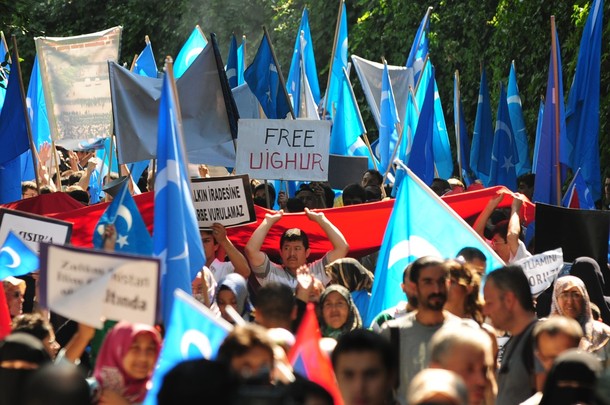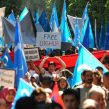
Ankara Anxiously Monitors the Xinjiang Crisis
Publication: Eurasia Daily Monitor Volume: 6 Issue: 130
By:

The riots in Urumqi, the capital of China’s northwestern Xinjiang region populated by ethnic Turkic Uighurs, have resulted in the deaths of at least 156 people, mostly Uighurs, and hundreds wounded to the shock of the Turkish public. Uighur associations accuse the Chinese government of concealing the real death toll. A spokesman for an Uighur solidarity group based in Turkey, Seyit Tumturk of the East Turkestan Culture and Solidarity Association (DTKDD), said that the death toll was over 500 and that there were thousands injured (Today’s Zaman, July 7). Erkin Emet, the deputy secretary-general of the World Uighur Congress claimed that the morgues were full and that the hospitals could not handle the sudden influx of wounded. Moreover, they accused the Chinese government of misrepresenting the Uighurs as separatists and terrorists linked to al Qaeda (NTV, July 7).
The DTKDD, with the support of other Turkish NGO’s, hastily organized a protest outside the Chinese embassy in Ankara to condemn the Chinese government’s handling of the riots. The Nationalist Great Union Party (BBP) leader, Yalcin Topcu asked that the Turkish government reconsider its relations with China and that parliament condemn the Chinese government’s actions (Yeni Safak, July 7).
Another protest was held in Istanbul, organized by the members of the nationalist Alperen Ocaklari group. Approximately 500 people marched to the Chinese consulate in Istanbul. The leader of the group appealed for the protesters to boycott Chinese commercial products. Meanwhile, the pro-government Independent Industrialists and Businessmen’s Association (MUSIAD) released a statement calling on Turkish investors to refrain from doing business with China. The Turkish Education Personnel Union also called on the government to act and asked Prime Minister Recep Tayyip Erdogan to tell China "one minute," a phrase he used in January at an international summit in Davos as part of a broader reaction to violence in Gaza (www.turkegitimsen.org.tr, Today’s Zaman, July 8).
Devlet Bahceli the leader of the Nationalist Action Party (MHP) criticized the Turkish government for not summoning the Chinese ambassador to the foreign ministry to protest against Beijing’s treatment of the Uighurs. Bahceli said that Erdogan was quick to adopt a strong stance against the crisis in Gaza and Palestine, extending an invitation to Hamas and promoting this organization within various international platforms, yet he has remained silent over the "massacre against the Uighurs" (Zaman, July 7).
One of the most influential dailies, Hurriyet, highlighted that 156 Uighurs were killed, and also alleged that the Chinese security agencies were responsible for the death toll (Hurriyet, July 8). The pro-government daily Yeni Safak accused the Chinese police of failing to prevent Hun Chinese from burning Uighur shops and criticized the inadequate response by the international community against the Chinese government (Yeni Safak, July 8).
Despite both the Turkish public and press expressing concern over the crisis in China the statement released by the Turkish foreign ministry was muted in its tone. On July 6 the foreign ministry released a statement saying:
"It is our expectation that the persons who are responsible for these incidents will be found as soon as possible and brought to justice. We believe that the necessary measures will be taken to prevent this kind of incident in the future in China, a country on the way to becoming more stable and prosperous. We extend our condolences to the people of the Xinjiang Uighur Autonomous Region in particular and to the people of China in general, to the families of those who lost their lives and wish speedy recovery to those who were injured" (www.mfa.gov.tr, July 6).
It appears that the Turkish foreign ministry’s statement did not convince Erdogan. He asked the Foreign Minister Ahmet Davutoglu to monitor the developments closely and keep him informed (www.haber3.com, July 7). Davutoglu stated "our expectation is to see that the tension ends as soon as possible. Turkey is watching these developments with concern and we are considering what we can do" (Anadolu Ajansi, July 7).
One of the factors that might restrict Ankara’s scope to criticize Beijing is that President Abdullah Gul recently paid an official visit to China, and eight Turkish companies signed contracts worth of $3 billion (Hurriyet, July 7). Moreover, Ankara wishes to avoid any conflict with China within the U.N. Security Council, where Turkey is a non-permanent member.
Given the Uighur communities in Turkey and their traditional support from Turkish nationalists, they might not remain passive over the crisis in Xinjiang. And given that the Uighurs are a sizeable minority, with many having major business interests within Turkey such as the leather related textile businesses in Istanbul, any further mishandling of the crisis by Beijing might damage its bilateral relationship with Turkey.




